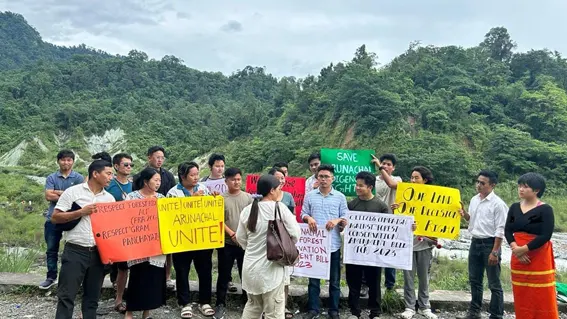Staff reporter
ROING, 17 Jul: Members of the Indigenous Research and Advocacy Group, the All Idu Mishmi Students’ Union, the Kundung Banggo Youth Organisation, and other organisations staged a demonstration here in Lower Dibang Valley district on Sunday to express concern over several amendments proposed to be made in the forest conservation amendment (FCA) bill.
The organisations stated in a press release that the proposed amendments to the bill that have raised concern are Section 1A (2) (c), which, they said, states that “forest land located within a distance of 100 kilometres along the international borders or the line of control or the line of actual control may be used for strategic linear projects of national importance and concerning national security; and Section 1A (2) (a), which states that forest land situated alongside a rail line or a public road maintained by the government, providing access to habitation or rail and roadside amenities, up to a maximum size of 0.10 hectare in each case.”
They also expressed concern over “exemptions to
public utility projects; general exemptions to security-related infrastructure; and Section 1A (1) (a), which states that land declared or notified as a forest under the Indian Forest Act, 1927, or any other applicable law.”
Other amendments that the organisations said they are opposed to are “exemptions granted to silvicultural operations, including regeneration operations, ecotourism, and safaris, and the amendment in Section 2, which would allow leasing of forest lands by the states, allowing forest land assignment to private entities or organisations not owned, managed, or controlled by the government, subject to terms and conditions specified by the central government.”
The release stated that “many of the proposed amendments in the bill adversely affect the protection of scheduled tribes (ST) and other traditional forest dwellers (OTFD) under the Forest Rights Act (FRA).”
“These amendments could potentially eliminate the requirement of obtaining consent from the gram sabha for diversion of forest land falling outside the scope of the Conservation Act (FCA).
“The FRA aims to recognise the forest rights of the STs and the OTFDs and rectify the historical injustice faced by tribal communities due to the denial of their forest rights,” the release stated.
The organisations emphasised that “any silvicultural operation should focus on augmenting biodiversity, prohibiting the plantation of non-native trees and the pruning of existing trees used as habitat, shelter, and foraging by important species of birds, reptiles, mammals, etc.”
“While ecotourism is intended to support forest conservation through economic incentives, the integration of market demands and associated developments has led to deforestation and negative impacts on wildlife. Peer-reviewed studies have highlighted that ecotourism activities can stimulate forest loss, obstruct wildlife movement, alter land use and land cover, pollute the landscape, increase human-wildlife conflict, and further fragment landscapes through linear disturbances like access roads.
“This form of tourism also exerts significant pressure on land and water resources,” the release added.
“Taking into consideration the aforementioned organisations alongside the forest conservation amendment bill of 2023 in its entirety, the organisations strongly rejects the bill to be tabled in the monsoon session of the Parliament,” it said.

